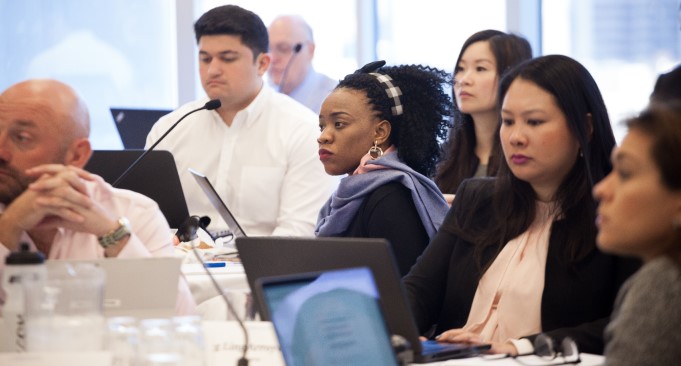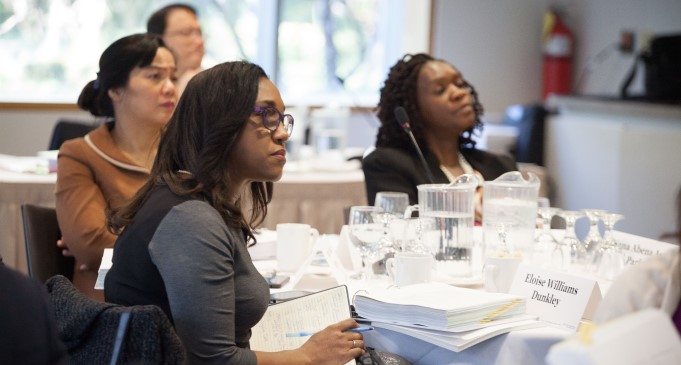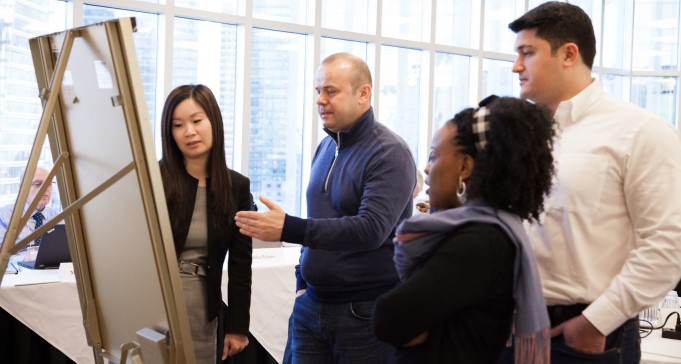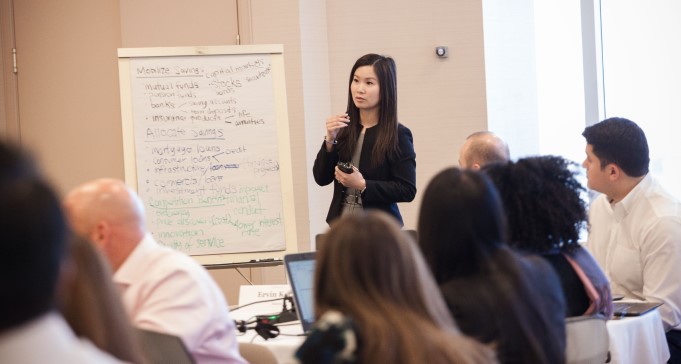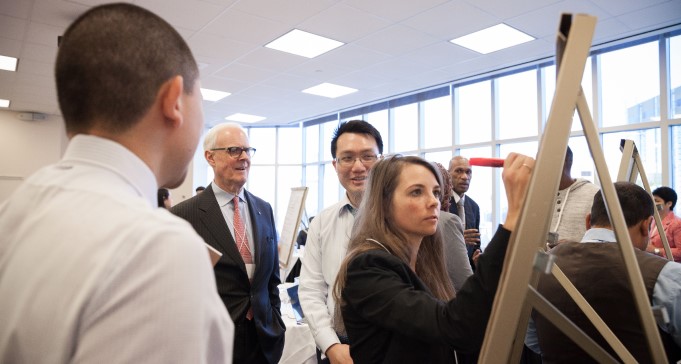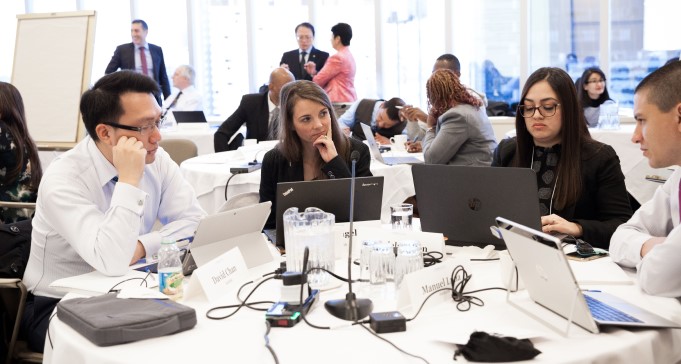The People Side of Supervision Series
One year into the pandemic, many financial supervisors around the world have experienced working remotely. Program Director Chuin Hwei Ng speaks with long-time TC partner Gerry Lewis on the present and future of remote work.
Listen to the podcast:
Read the full transcript
Chuin Hwei:
Hi everyone. Welcome to TC's podcast on The Go. I'm Chuin Hwei Ng Program Director from Toronto Centre. When the pandemic hit in March, 2020, the shift to remote work quickly became a defining feature. According to Stats Canada, the number of Canadians working remotely across all sectors jumped from 10% pre COVID to about 40% as of May, 2020. And the situation is likely to be similar all over the world. Today, we have the pleasure of speaking with Gerry Lewis, a long time partner of Toronto Centre, who also finds themselves in the same situation as many people in organizations in working remotely. So welcome back, Gerry.
Gerry:
Thank you, Chuin Hwei. It's Wonderful to be back. Hello everyone.
Chuin Hwei:
Good. Can we start by having you introduce yourself and your association with Toronto Centre and with the financial supervisors whom you work with?
Gerry:
Absolutely. I've had the fortunate opportunity to work with Toronto Centre actually almost since its inception in 2000. And, and I guess through the 21 years, I've worked with them in a capacity from a facilitator and to working with them on marketing and communications and some strategic initiatives as well. And one of the things I always say when I'm in front of supervisors and regulators when we're doing some programs with them, I'm the first to say I'm not a supervisor or regulator. But I bring with me in terms of leadership management competencies that I bring to their programs. Having said that when we, I think that after 20 years of working with Toronto Centre, I am pretty sure I know quite a bit about risk-based supervision, on and offsite supervision, crisis preparedness resolution as well. So technically I guess I could be an honorary supervisor and regulator.
Chuin Hwei:
Yeah. Let's bestow the title on your honorary, that sounds good. Yes. You might have heard Gerry in our episode 40 on Managing Supervisory Teams Remotely. And in that episode we discussed how financial supervisors can stay connected and function as a team even while they are working remotely. So do check out the episode if you have not already. Now, today we are taking a deeper dive into what it means for the individual in terms of productivity and also mental wellbeing to work for prolonged periods at home. Now, Gerry remote work in the sense of working away from the office may not be such a new concept for some of our financial supervisors. Now for financial supervisors who conduct onsite inspections, for example, they might find themselves away from the offices and their desks and working remotely so to speak with their team in the sense that they will be camped out at the premises of the financial institution for maybe weeks at a time. Now, today, of course, we are talking about a very different concept of remote work, literally working where you live.
And instead of having our colleagues around during the workday depending on our particular circumstances, we may be alone, we maybe with family, we may be with our pets. And it becomes really hard to draw boundaries, both physical and mental boundaries between work and home. So Gerry let's start by comparing and contrasting living at work versus working from home.
Gerry:
Thank you, Chuin Hwei. You're absolutely right. I think first of all, your point about remote work is not new. That is something that I think every organization has either implemented as part of their structure or have experimented with it. So that's not new. I think what's new is that really around mid March in 2020, I think the world was put into an imposed work from home. It was no longer a choice. And even though remote work is not new, that imposition change the way we think about remote work. So I think that on that day or on that week depending on where you live, remote work changed, we no longer had that choice. We used to have a choice, we no longer had it. So suddenly that was the norm. So that was number one. I think that was the catalyst to changing the perspectives of what remote work is.
Now, you're going to fast forward 15 months and a lot has happened in the last 15 months. And the term you just mentioned before the question of, are we really living at work versus working from home, I think is a very interesting way of putting it. And the living at work tagline, if you will, I saw from a Harvard Business Review, an article, in that more and more people are feeling as though they're living at work. And let me just define that a little bit. I guess working from home is we've been calling it for 15 months and that's still what we call it, working from home. But when you talk to people about what their experience is like, it doesn't feel like you're just working from home.
It actually feels like they've brought their family to work. So that's why they're calling it living at work. So it feels like, every day now I am never surprised when I see a spouse in the background, children running around, children wanting to be on camera, pets jumping on people's laps, construction happening behind you. So it feels as though we brought our family to work. And that's I think is the challenge because there is no longer that separation and the feeling of I'm juggling my life in my work 24-7. So that's how the live at work has kind of come into play
Chuin Hwei:
So I'm hearing Gerry is that first, we don't have a choice, might seem to lose a little bit of the autonomy. And second, perhaps a little bit of loss of control. You're bringing your family to work not one day a year, but every day of your work day at least. Now how does that feel? How did we get here?
Gerry:
Well, I think how we got here is the fact that we... It's part of that imposition. We were forced to make this happen. It was literally overnight and we all experienced it. We all remember what it was like back in March, 2020. So I think how we got here is our first mode was really, and I don't mean to make this overly blunt, but it really was about survival. It's like, how do we keep things going? How do we keep business as usual in whatever organization we work in? Whether that's a central bank, whether that's a supervisory regulatory authority, or whether that's a type of my company where it's about communication, marketing and strategy. It was how do we keep the lights on? So that's how it happened. So we were really surviving and in that survival we had to adapt to whatever was happening around us. So that's how we came to be. And I think the challenge now after 15 months, and we know that even though people are talking about going back to work, that's going to be a journey as well. So right now in this middle period, I call it, how do we go from surviving to thriving in this sort of remote work environment? So it's where we are. It's how do we do it better?
Chuin Hwei:
Mm-hmm (affirmative). Just picking up on that point, that Gerry so it seems to be a matter of moving from survival to thriving in this new environment. So let's talk a little bit about productivity then. Are we spending more time at work and are we more productive because we are working longer hours?
Gerry:
I think that's a really good question Chuin Hwei. I think one of the first reports I recall reading, let's say in May of 2020 when this all started, was everyone was talking about how productive things were despite the fact that people were working from home. And then later on we... in fact, throughout the past 20 months, we didn't hear anything about dropping of productivity. We also heard that many employees are saying they enjoy working from home. They have found a nice sort of pattern in working from home. So I think that's the good news of remote work and whether you call it living from home or working from home. There's definitely productivity happening, there is some balance happening. I think when we talk about the pure term of productivity though from a business perspective, it is important to look at all the data points of what productivity is.
Because when you look at productivity, it's not just about outputs, that's one part of productivity. Another part of productivity is really from an employee side, how are they feeling? What is their mental state? What is their stress level? Because ultimately that will impact output, right? So if we looked at productivity as a whole set of data points, I am not sure if we're all that quote unquote so productive. I think if we look at one set of data points on are we getting things done? Absolutely. So I do think that this is a little bit of a red flag when we've talked productivity and we look at we are productive because we're working probably longer hours. Our days are no longer that traditional 9:00 to 5:00. It might've started that way when we went remote, but it's been bleeding in. And I think everyone listening here will probably nod their heads if I asked them, are you getting emails well into the evenings? Are you responding to emails well into the evening?
Are your weekends feeling more like weekdays because of the amount of work that you're doing, responding to, preparing for? So all of a sudden, there's this feeling that weekends are shorter, weekdays are longer. And I think that that is part of the reason why some people are saying, "Yeah, we're really productive." But then what is the end result of that from an employee side? To me it's not a huge concern at this point, but it is definitely a red flag we should notice and we should be looking at when we're talking about our teams
Chuin Hwei:
Well let's stretch this concept of productivity a little bit more because as financial supervisors we are not producing widgets day in, day out. We are really working with people, we are working with systems, we are working with peers in information sharing. So I'm wondering whether we can talk a little bit more about what we gain and lose from working remotely. So as you know Toronto Centre prides itself on working with financial supervisors from all over the world, many from developing countries, and just from my personal experience as a program director. In the past, the whole TC team would travel to the location of our partners to deliver the programs. And for the TC team, there is a clear transition, right? Both in space and time. We traveled to the country, we adjusted the jet lag. We immerse ourselves in the environment. We see for ourselves the challenges and also the resources that our partners bring when they come to the program.
So we were in the same physical space, we were in the same time zone. Now, when I'm working from home, I do experience a sense of wonder that this is at all possible to connect with people halfway around the globe, but I also feel a sense of remoteness in the emotional sense of the word, not just in the physical distance sense of the word. And there is a sense of not being so connected because we are no longer in the same environment with the same constraints. And I wonder if we have to work so much harder building a sense of connection and empathy of the people that we work with for this whole enterprise to be productive, right? And just as an example in these extraordinary times, now the person that you're talking to in the screen could be in a location that's experiencing a really sharp rise in COVID-19 cases and it's very stressful in the work environment and the family environment. And we might be in a location that says in a different part of the COVID cycle.
And it seems that we really have to be mindful when we interact with the partners since we're no longer in the same physical space on how the environments are interacting with their work environments. So I wonder if this resonates with you when working with partners across countries and across time zones.
Gerry:
I think you bring up a very good point Chuin Hwei in terms of...The remoteness does bring a sense of number one, the isolation from an internal perspective. So we ourselves feel like we're disconnected. Your other point about speaking with partners and not knowing their situation, I think is very poignant. I'm talking to you right now, I see you in your remote room, you see me and we're talking about business an it seems like everything's fine. But I don't really know the situation where you are and nor do you where I am here in Toronto. And I think that that is the danger of not having enough of an understanding when you're working with partners because it's... When we went remote and we started using Zoom and I questioned a lot of these platforms, what if these platforms didn't exist? And they talk about if this pandemic happened even seven years ago, forget 10, even seven years ago, this would be a very different outcome of the way we do business.
So I do think that the time zones, the different geographic locations play a huge part in how we actually empathize with our partners that we're working with. And one of the things that I think is really important is I'm not sure whether we're going to go in this direction, but in terms of not always just keeping it to business. And I think to close the gap when you're talking about, I don't know the situation where you are, we've learned that once our Zoom or whatever teams turn on, it becomes business. It's like, "Hi, how are you?" It's Great. "Let's go through the agenda today." Boom, you're back into business, right. And what needs to happen and I hope people are doing it, it's just a start with knowing what's going on. How are you? How are things there? Is the situation getting better, is it getting worse? And I think that's a really important part that we must put back in to create that sense of remove the isolation and bring back the sense of understanding, because that will impact the rest of the conversation as it relates to business.
If I know for example, your country is still going through its third wave while mine is actually... everything's opening up, I need to be very aware of that when I speak with you. Because where your stress level is, is in a completely different space from mine.
Chuin Hwei:
I feel that we almost have to lift or pierce through the virtual backgrounds that we all put in Zoom and all of that networking that usually occurs during tea breaks or after hours with our program participants somehow all that needs to be brought back into the Zoom room am on screen. Let's talk a little bit about transitions if we may. Transitions across time, across space. And we are lacking those sort of mental markers as we work from home, the boundaries between work and then everything else or life. So I want to test these terms of you. Since COVID, there have been many new terms that have been bandied about, and two that I really find interesting, the first is work-life integrators. And the second one is work-life segmentors. And from what I understand, integrators are people who are able to transition fluidly from work to personal life to work again, they talk shop all the time.
They don't mind answering emails and chats after work. It's part of their DNA to begin with. And on the other hand you have segmentors. These are people who have defined times when they are working and when they are not, and once they're done, they're done. And then they attend to very valid personal needs like errands and fitness and family outside of their work hours. Now, any thoughts on whether these terms are accurate or whether they're a good framework to see work styles of various people. And perhaps, if you don't mind could share with us which do you identify with?
Gerry:
I am chuckling Chuin Hwei because these terms are I think very accurate of how people work. So for example, work-life integrator, as you mentioned are people who live to work. It's really in their DNA. So they're over dinner, over a glass of wine, they see an email, they respond to the email, a text comes in they respond to a text whereas the segmentors are really very much people who have... For whatever reason or whatever justification they basically said at this time I have stopped working. And there are many different ways in which they demonstrate that whether it's putting the phone down, I'm plugging their phone, not looking at their phone, not doing emails. So to answer you first your question, which I'm sure you're curious which one I am, you should probably talk to my team because they can probably within a split second tell you which one I am.
I'm definitely an integrator. I live to work. My phone is usually with me at all times except for when I sleep. But other than that, my phone is always with me. Do I check it all the time? I try to separate it, but it's very difficult. So I do respond a lot to whatever channel comes in, whether it's email, text, WhatsApp, whatever platform that is. So I'm definitely an integrator, but I think these terms are good to use because number one, whether or not you identify with one or the other, I think it's important to be aware of them. I think that's a really important part to almost ask yourself, "You know what, I never really thought about it, but I am more like this versus that." And I think the awareness is the first part of knowing what you should do more of, or what you should do less of.
Chuin Hwei:
And that awareness I think is particularly important for our listeners who would be leaders and managers in their respective agencies. I can really see a potential conflict in the workplace when an integrator type boss emails that segmental employee on the weekend saying, "Do this, do that."
Gerry:
And my team members have been talking to you Chuin Hwei. They're probably telling you what's happening with me.
Chuin Hwei:
Oh, I had no clue that this was accurate. This as managers I think in what you said Gerry about having awareness, self-awareness first, and then awareness of your staff style, each of them, what they prefer is really important for the team to work effectively together.
Gerry:
Absolutely. I think the one thing I want to mention before we talk about more leaders and managers and teams, I think a really good way to look at integrator and segmentor as opposed to one or the other. I think it's a really good thing to do to look at it as a spectrum. So on the very far end of one, spectrum, we have a real work-life integrators. So, someone who literally has the phone with them is attached to their right hand, so to speak, and it's constantly working. Then on the other end of the spectrum, you have a real segmentor, which is someone who doesn't even look at the phone till whatever, 9:00 a.m. in the morning and at 5:00 p.m. when technically businesses close, they plug in their phone to recharge for the next day and don't even go near it.
So if you look at the two spectrums, that is a really good way to understand the two concepts. And then from an awareness perspective is to look at where you are on the spectrum. I think that's going to be really important because it's only when you can see where you are along the spectrum can you then say, "You know what, this is getting a little bit out of control. I need to scale back towards a bit more this way." Or, "I realize I'm always behind in my work. I can't shut off at five because the next morning when I open it a 9:00, I am flooded with emails and I get stressed by 9:15." So then you might then say, well, "As a segmentor, I need to dial it up a little bit to become more integrated. So I can balance this a little bit better.
So I think looking at it as a spectrum is going to be critical. Your question about leaders and managers, and how to really work as a team in terms of this spectrum, I think is a very good question. It starts with awareness, where am I, where's my team, where are my partners? And from there, you can say, "You know what, if I recognize that I'm a true blue integrator, phone's stuck to my hand, but my team is a true blue segmentor, there needs to be a conversation." There needs to be a conversation to say, how do we meet somewhere in the middle, where I'm not frustrated with you and you're not fed up with me. And I think that that's the...One of the things that we talk about beyond just remote work is effective communication. Right now is probably the most important time to not just communicate necessary information to get work done.
It's important to communicate how we can work better together. So whether or not, you're talking from a supervisory perspective, central bank perspective, or myself from a private sector perspective, it's exactly the same. If we don't communicate effectively, we're not going to find that middle ground. And I think the operative word here is effectively. Because I don't think there's any shortage of communication channels. We are inundated with ways in which we can communicate, phone texts, WhatsApp, any app, Email, Zoom platform, Teams, whatever you want. There's no shortage of communication channels, but it's the effectiveness of the communication that's going to be key. So with regard to leaders and managers, know where you are, know where the other individual is, figure out what's going to work best and talk about it.
Chuin Hwei:
Yes. I think also part of effective communication is really to make explicit your expectations of the team and also I think vice versa to listen to the team on what their expectations of you are as the supervisor. And actually I was thinking wile you were speaking Gerry, that perhaps this boundaries are also fluid, integrator and segmentor, because it really depends on what the demands of your job as a financial supervisor are. So if I am a financial supervisor, who's handling financials institution, or even financial sector in crisis, then there's no way that I can do my job effectively as a segmentor. I can't say that, crisis only happened from 8:00 a.m. to 6:00 p.m., my time and we all take a break during the weekends. So it just doesn't happen that way. So I'm sure that as a responsible financial supervisors, whether the inclination is to be a mentor or not when duty calls in, I'm sure I'll listen as well, will step up to take on the roles as integrator or segmentor, whichever serves the public course that they are serving best.
Gerry:
Absolutely. I think to your point about the crisis is a perfect example. I think though, there are a lot of people who are not quite aware of how to have that conversation to bridge the gap between their approach and someone else's approach. So if I'm a integrator, we're human beings. We assume that everyone is like us. I'm going to assume that everyone has a phone attached to their hand, and they're always checking their email. The reality is it's not. So it's one thing to number one, know who you are, understand that not everyone operates the same way you do. I know that sounds so simplistic, but it's a big reality that we need to constantly think about. Then most important thing after that is to then say, "If that's the reality, I'm not about to become a segmentor, but how do I work with my team in such a way that we find a happy medium?"
And for example, I'll give you one. We work with someone, a client and on their signature line of their email, so it's on every single email that they send, the line is my work hours may not be the same as yours. So please don't feel the obligation to respond at the time that I send this message. Now, that is a really interesting message because it's recognizing that when this message hits my inbox, if it's outside my work hours, I'm may not need to feel the urgency to answer it and they understand. So if I'm a supervisory and regulatory environment, we may not have that much of a latitude because there are certain things that are very time sensitive. But I do think as a team to be able to communicate with your team to say, "How are we going to operate? How are we going to deal with situations that come in? What is our mode of communicating and working in this environment," I think is a really important thing to set up front.
Chuin Hwei:
I really liked the statement that you mentioned just now. I think it quite an exemplar of clear communication and also setting expectations, right upfront. So, now I'm wondering Gerry, perhaps we can move to gazing a little bit into the crystal ball. More and more people hopefully getting their vaccinations. And there is talk of returning to a more normal way of life and returning to work as work used to be. But at the same time, we are hearing that there's only a small of employees who really want to go back to pre-COVID type of work arrangements. Survey after survey has found that the majority want to keep some elements of working remotely and to make it a permanent part of their work lives. So what are your thoughts on how it will play out?
Gerry:
I think it's... First, I thank you for setting the question up as a crystal ball because no one really knows. But I do feel, and from everyone I've spoken with, we are not going to be returning to the pre-COVID situation. I think that there has been too much that has... And there's many reasons why a lot of people are saying we're not going back to the pre COVID situation. There is a health reason. So the fact that, COVID is not technically gone. There is going to be... There is still risks out there in terms of whether or not another variant or coronavirus is out there. So there's always that sort of health concern factor, but that's just one factor. I think another reason why people are saying it will not go back to the pre-COVID work environment is the fact that we have suddenly proven without a doubt, that work can be done outside the office.
It's never been more proven to a point that you do not need to be in the office to get things done. Now that's to say for certain roles, certain positions, there are certain things that you just cannot. But for a good percentage of the population that has been proven. The third reason why people are saying we're not going back to pre-COVID situation is the fact that people are actually enjoying the fact that they can work from anywhere, whether it's from home or anywhere they choose. So I think those three factors are quite clear to say that we will not go back to the exact way of let's call it 2019 work environment. So that's how I see it playing out that it will not go back to the same. How will it look? I don't really know. I think there's going to be a hybrid. But it's interesting because just last night I saw an article on Bloomberg and it said... this is North America stats stats only though. 74% of people would rather quit their jobs than having to go back to work in pre-COVID environment.
Now that was an astounding, I don't know how many people they surveyed, but it's really spoke to the fact that people are much more enjoying working in a sort of remote environment, not to say that they will never go back, but they won't go back to the way they were. And the article actually further listed the two top reasons why that 74% said they would not go back. Number one 84% of that, 74% said it was because of the commute. People are sick and tired of the commute to and from work, that stress level, that time lost, they can get so much more done from home. So it's really interesting. I don't know how it will play out to your original question. I do feel that the winner meaning the winning organization will be the one that actually thinks ahead and says, how do we make this work so that everyone wins versus, okay, one second vaccinations are in, let's give it a month, everyone, we should come back to work. I think those organizations will be challenged from a talent perspective.
Chuin Hwei:
I feel that we have just collectively experienced a global proof of concept for remote work. And other ramifications can be I think vast, not only in terms of work arrangements, but in terms of implications for real estate values, for urban course, for urban planning, for transportation networks, what sort of peak capacity do they have to serve? There's probably a time and space for many other podcasts from other experts on these topics. But it's been very interesting, Gerry. And if there's anything that we learned so far is that things can change in an instance, and we are really far more adaptable than we give ourselves credit for. Gerry, perhaps we can conclude with some words of advice, especially for those who are still working remotely, maybe feeling a little bit off balance, how can they find a balance again so that they can present the best version of themselves at work and in life?
Gerry:
Thanks Chuin Hwei. I really enjoyed this conversation as well. And I think that what... I love your term global proof of concept. I think you should just own that and trade market because I think that's exactly what happened this past year. In terms of words of advice, maybe I can break it down from maybe from a leader manager and then from a team member perspective. I think that those are slightly two different things. From a leader or manager, words of advice is, be aware of where you are in this living at workspace or working from home space in terms of integrator, segmentor, and knowing where your team is. I think that's important. When you speak with your team, try to understand their situation, be empathetic. And one of the things that we do here a lot, and I know again it's human nature.
When you hear someone not doing well, whether it's mentally or they're just struggling, it's human nature to try to dismiss it. So if somebody says, "I'm really having a bad day, I'm really struggling," human nature dictates that we often say things like, "At least your family is fine." Or "At least we're still working." "Or at least"... I think an advice I would give to managers and leaders when you hear your team struggling, be where they are in that moment. So if they're struggling, ask them why they're struggling, "What's going on, can you help? Do you need a little bit of time off?" I think that will gain so much trust for you and your team that will pay off in the end. That's really important. I think from a team member perspective, in terms of advice, I think understanding the role you play in the larger scheme of things is very important. When you're remote, it feels as though the only thing that you need to be responsible for is what's in front of you, the task list that's in front of you.
And you lose the sense of the bigger picture of what an organization is trying to do or what the organization is struggling with. I think as a good team member go beyond your to-do list and speak to the team about what can we do to all get out of this together? What can we do to all improve the situation? And I think that built the trust the other way. So if we build these channels of trust from a leadership perspective with empathy, from a team member perspective with understanding of what the larger picture is, I actually think we've just increased the effectiveness of communication. And I think if there's anything that's been taught to us over this past 15 months, we've always said that communication is critical. I think that these 15 months have taught us that good communication, honest, transparent communication is vital to the survival of any organization. So I hope that these are things that people will walk away with in terms of how they're going to communicate to each other after listening to this podcast.
Chuin Hwei:
Thank you so much, Gerry, this has been a fascinating conversation and we hope to have you back on another podcast as we explore the people side of financial supervision, right? And so I'm here today with Gerry Lewis and you've been listening to a Toronto Centre podcast on The Go, thank you for joining us.
Gerry:
Thank you Chuin Hwei.















